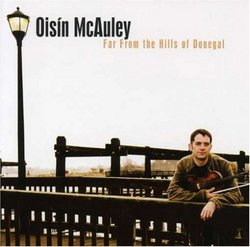Exceptionally Well Done
TG | 02/08/2007
(5 out of 5 stars)
"This is a great CD of predominantly Irish fiddle music - with a few original and french-Canadian tunes thrown in for good measure. It's very well played by Oisin and the guitar accompaniment (mostly by Shane McGowan) is top notch. The tunes are wonderfully arranged (a little bit of improvisation here and there) and it's very well recorded. It's early, but this sound to me like one of the top trad irish CDs of 2007."
Olsin McAuley - Far from the Hills of Donegal
Martin G. Miller | Ames, IA USA | 02/11/2009
(5 out of 5 stars)
"This CD is a delight. McAuley is one of the finest Irish fiddlers in the world. His playing is clean, tasteful and accomplished. Excellent backup."
More traditional than atmospheric
John L Murphy | Los Angeles | 03/11/2008
(4 out of 5 stars)
"Danú's fiddler, from the southwestern peninsula of Donegal, draws upon local inspiration for his self-produced solo debut. It's instrumental, not vocal. The regional style of fiddling emphasizes staccato bowing, a harsher (perhaps to some ears more grating and less accompanied) delivery, and influence from Scottish dances such as the strathspey and the highland. McAuley covers famous musicians such as Con Cassidy (a self-titled barn dance), Patsy Touhy (My Former Wife), and John Doherty (Paidin O'Raifertaigh). He adds Gille le Bigot's Swing and Tears, a tribute to a Breton guitarist, Ronan Browne's version of the air Port na bPucaí, and his own waltzes and reels. Peter Browne and Ronan Browne back him on button accordion and pipes respectively.
Guitarist (not the Pogue!) Shane McGowan reveals a gift for understated, yet nimble, guitar on seven of the thirteen tunes. This recording eschews atmospheric keyboards, with the exception of the bland Tune for Gillian, in favor of simple, less adorned pieces from mainly Irish but also Scottish sources. The production works best when steering clear of the overly stuffed, too ambient-sounding, New Age-tinged styles that on many Compass Records -- and what was Green Linnet-- still permeate many recent Celtic-Irish musical offerings of the past couple of decades.
Less lush than Lúnasa therefore, akin more to the revivalists of older sounds found in Téada, the Irish manner of playing here represents, as with Téada's fiddler from Sligo Oisín MacDiarmada, a preference for conveying instrumental prowess without production filigree. Such a direction shows promise for younger Irish players. The retreat from the swirling, synthesized treatments favored by many Irish musicians in the past two decades should hearten listeners seeking out styles hearkening more to the village elder than the trends of the city hipster."


 Track Listings (13) - Disc #1
Track Listings (13) - Disc #1